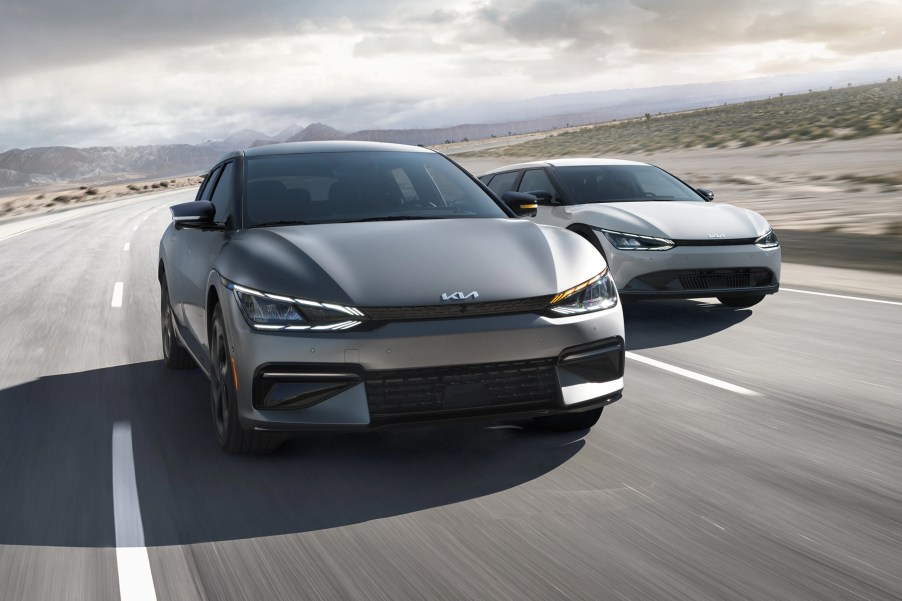
2 Car Companies Are Benefiting From Consumers Abandoning Brand Loyalty for EVs
Electric vehicles are driving a massive change in how the automotive market operates, and as a result, car buying is quite different from how it was only a few years ago. One emerging trend is that EVs are destroying brand loyalty by attracting new buyers. And two car companies — Hyundai and Kia — are benefiting handsomely, thanks to their electrified offerings.
The EV trends driving the current car market

In addition to electric cars drawing buyers from other brands, there are three other major EV trends to watch, according to Edmunds.
One is that EVs are attracting luxury shoppers with a general shift in how they define luxury. For instance, powertrains and in-vehicle technologies seem to be rising in importance over seat fabrics.
Another trend is that EVs sell for higher prices than their gas-fueled counterparts. That applies to brands like Ford, whose lineup consists primarily of trucks and SUVs.
The last trend is that despite the higher initial costs, younger consumers are choosing EVs. That means automakers can count on more new EV purchases in the future.
EVs are luring previously loyal buyers away from their favorite brands
Attracting car buyers loyal to other brands has been historically tricky, Business Insider reports. After all, automakers do everything they can to retain a customer’s business. Examples include spending millions on marketing campaigns, using focus groups to identify problem areas, and implementing customer feedback in the next batch of vehicle models.
However, EVs seem to be luring consumers away from other brands almost effortlessly. The customer conquest figures for Hyundai and Kia are particularly phenomenal. For instance, the trade-in conquest for the Hyundai Ioniq 5 is 81%.
For context, the trade-in conquest shows the share of cars traded for a particular EV from another brand. In simpler terms, that’s the percentage of vehicles traded in for a car like the Hyundai Ioniq 5 from brands other than Hyundai.
The Kia EV6’s trade-in conquest is slightly lower at 79% but still hugely impressive.
So, why are the Hyundai Ioniq 5 and Kia EV6 attractive to new buyers? The key likely lies in the two EVs’ specs and features.
What makes the 2023 Hyundai Ioniq 5 a good car?
Hyundai lists the starting MSRP for the 2023 Ioniq 5 as $41,450. The base-model SE Standard Range has a 168 hp powertrain offering a 220-mile range. Buyers also get ultra-fast charging, 19-inch wheels, and futuristic dual 12.3-inch screens on the dashboard.
This EV’s other perks are Android Auto, Apple CarPlay, heated front seats, and multiple advanced safety features. They include lane keeping and lane following assist, driver attention warning, and blind-spot collision-avoidance assist.
Upgrading to any other Hyundai Ioniq 5 trim brings 225 hp, rear-wheel-drive, and a 303-mile range. An optional all-wheel-drive system brings 320 hp, although the power boost reduces the range to 266 miles.
How is the 2023 Kia EV6 luring buyers away from other car companies?
The Kia EV6 is built on the same platform as the Hyundai Ioniq 5, given that both brands share the same parent company. However, their differences start at pricing, with the EV6 available from $48,500 — $7,000 more than the Ioniq 5.
The cheapest trim — the Wind(RWD) — makes 225 hp and gets 310 miles on a full charge. It also offers fast charging, 19-inch wheels, vegan-leather seats, Android Auto, and Apple CarPlay.
Optional dual-motor systems bump the Wind and GT-Line trims’ power output to 320 hp, dropping the range to 282 miles for the former. For the higher-priced GT-Line, the range falls to 252 miles.
There’s also the top-of-the-line Kia EV6 GT, harnessing 576 hp and zooming from 2 to 60 mph in 3.4 seconds, Kia claims. It’s available only with AWD and is limited to 206 miles of range.
And like the Ioniq 5, the EV6 comes with dual 12.3-inch screens.
Overall, the EV6 and Ioniq 5 are two EVs responsible for Kia’s and Hyundai’s success in luring consumers away from other brands.


